Alumni Careers Event (3rd May 2019)
‘So, what do you want to do after uni?’ is a familiar question that undergraduates face when discussing their degree, too often answered with something along the lines of ‘I have no idea!’. Due to its versatility, life after a biological sciences degree can be open-ended, leaving those without a career plan feeling overwhelmed. So, what better way to explore your options (biology-related or otherwise) than to hear from the University of Bristol’s own Biological Sciences alumni? During the evening of Friday 3rd May, nine speakers presented short summaries of their post-university life, including how they utilised their degree and gems of wisdom for current biological sciences undergraduates looking to make the most of what their degree offers them.
Sophie Lanfear – Producer, Silverback Films
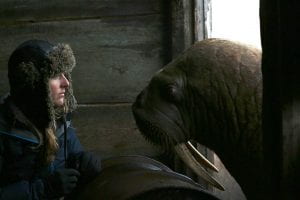 First to present was Sophie Lanfear, a producer at Silverback Films, having been recently involved in the Attenborough series ‘Our Planet’ on Netflix. Graduating from Bristol in 2005 with a BSc in Psychology-Zoology, Sophie emphasised how she combined her passion for science and creativity through photography whilst studying meerkats at Cambridge University’s Kalahari Meerkat Project. The film crew of the TV series ‘Meerkat Manor’ advised Sophie that going directly into the filmmaking industry would be more worthwhile than a PhD, leading her to the BBC for 8 years where she provided insight into animal intelligence for documentaries. She recently specialised in the Arctic and filmed for the BBC series ‘The Hunt’, during which her unique on-location experiences included a polar bear breaking into their accommodation! Aside from the adventurous elements of her career, Sophie said that her degree has helped her put scientific integrity into filmmaking and aided her research discussions with the field biologists working with her team. She is glad that her work is now having as global a reach as Netflix provides!
First to present was Sophie Lanfear, a producer at Silverback Films, having been recently involved in the Attenborough series ‘Our Planet’ on Netflix. Graduating from Bristol in 2005 with a BSc in Psychology-Zoology, Sophie emphasised how she combined her passion for science and creativity through photography whilst studying meerkats at Cambridge University’s Kalahari Meerkat Project. The film crew of the TV series ‘Meerkat Manor’ advised Sophie that going directly into the filmmaking industry would be more worthwhile than a PhD, leading her to the BBC for 8 years where she provided insight into animal intelligence for documentaries. She recently specialised in the Arctic and filmed for the BBC series ‘The Hunt’, during which her unique on-location experiences included a polar bear breaking into their accommodation! Aside from the adventurous elements of her career, Sophie said that her degree has helped her put scientific integrity into filmmaking and aided her research discussions with the field biologists working with her team. She is glad that her work is now having as global a reach as Netflix provides!
Niall McCann – Director of Conservation, National Park Rescue
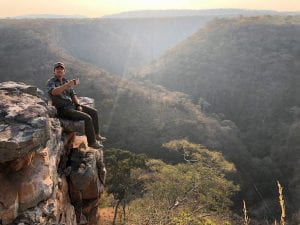 During the summer of Niall’s second year at Bristol, he proved his keen interest in research by organising an expedition to Bolivia to study giant otters for seven weeks. Following his graduation in 2004, he ignited a passion for conservation whilst studying biodiversity in Guyana, leading to a successful campaign preventing a river he worked on being claimed by gold miners. He continued working in conservation through a PhD at Cardiff University studying Baird’s Tapirs in Honduras, realising he wanted to act against the extinction he was witnessing. Therefore, he founded a community ranger programme in Honduras, which still continues today. He later established his charity ‘National Park Rescue’, identifying Africa’s most at-risk national parks and integrating law enforcement and conservation to protect endangered species. Niall had already attracted the attention of the media through presenting docu-series on PBS and partaking in extreme hobbies, such as rowing across the Atlantic Ocean and cycling over the Himalayas (twice!), aiding the publicity of his cause. He currently works closely with the UK Government’s response to the illegal wildlife trade and recently became a National Geographic Explorer. Niall’s closing words of wisdom to the audience were ‘do something you’re passionate about, be tenacious, volunteer and say yes to every opportunity’.
During the summer of Niall’s second year at Bristol, he proved his keen interest in research by organising an expedition to Bolivia to study giant otters for seven weeks. Following his graduation in 2004, he ignited a passion for conservation whilst studying biodiversity in Guyana, leading to a successful campaign preventing a river he worked on being claimed by gold miners. He continued working in conservation through a PhD at Cardiff University studying Baird’s Tapirs in Honduras, realising he wanted to act against the extinction he was witnessing. Therefore, he founded a community ranger programme in Honduras, which still continues today. He later established his charity ‘National Park Rescue’, identifying Africa’s most at-risk national parks and integrating law enforcement and conservation to protect endangered species. Niall had already attracted the attention of the media through presenting docu-series on PBS and partaking in extreme hobbies, such as rowing across the Atlantic Ocean and cycling over the Himalayas (twice!), aiding the publicity of his cause. He currently works closely with the UK Government’s response to the illegal wildlife trade and recently became a National Geographic Explorer. Niall’s closing words of wisdom to the audience were ‘do something you’re passionate about, be tenacious, volunteer and say yes to every opportunity’.
Shaaron Leverment – Deputy CEO, UK Association for Science and Discovery Centres
 Shaaron followed a different path after her graduation in 1997 by creating her own science-outreach business ‘Explorer Dome’, engaging young people’s interest in space through taking a portable inflatable planetarium to schools. She has since obtained qualifications in astrobiology and is the former president of the British Association of Planetaria. Now, Shaaron is the Deputy CEO of the UK Association for Science and Discovery Centres, working on national programmes with organisations such as the UK Space Agency and the Royal Society, promoting science engagement and education. She is particularly passionate about tackling inequalities in STEM education, highlighting how those of different gender, ethnic, and socio-economic backgrounds are still left out. Shaaron recently completed an MSc in Applied Neuropsychology on the effects of chronic inflammatory conditions on sleep, illustrating that it is possible to be involved in multiple scientific fields after university! She laughed about how 20 years on you still might not know what direction you are going in but emphasised that the course she did at Bristol and the people she met were central to her career path. Her top tip encouraged undergraduates to build their network as early as possible.
Shaaron followed a different path after her graduation in 1997 by creating her own science-outreach business ‘Explorer Dome’, engaging young people’s interest in space through taking a portable inflatable planetarium to schools. She has since obtained qualifications in astrobiology and is the former president of the British Association of Planetaria. Now, Shaaron is the Deputy CEO of the UK Association for Science and Discovery Centres, working on national programmes with organisations such as the UK Space Agency and the Royal Society, promoting science engagement and education. She is particularly passionate about tackling inequalities in STEM education, highlighting how those of different gender, ethnic, and socio-economic backgrounds are still left out. Shaaron recently completed an MSc in Applied Neuropsychology on the effects of chronic inflammatory conditions on sleep, illustrating that it is possible to be involved in multiple scientific fields after university! She laughed about how 20 years on you still might not know what direction you are going in but emphasised that the course she did at Bristol and the people she met were central to her career path. Her top tip encouraged undergraduates to build their network as early as possible.
Hendrikus van Hensbergen – CEO, Action for Conservation
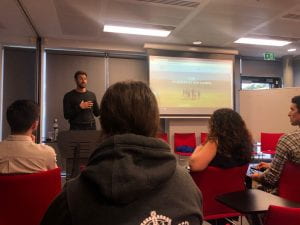 Hendrikus graduated with a BSc in Biology in 2010 without a career plan, and settled on an MSc in Biodiversity, Conservation and Management at Oxford University. His first job advised timber companies on sustainable sourcing, providing the basis for his subsequent job as Forest Policy Manager for WWF. Hendrikus was invited to speak about his career at his secondary school, leaving surprised at the engagement and energy that young people had for conservation. He noticed a gap in the market for conservation engagement schemes aimed at teenagers and filled it with his charity Action for Conservation – offering workshops, residential camps and ambassador programmes engaging 12-18-year-olds in UK conservation. Focusing on those from disadvantaged urban areas and minority groups, Hendrikus hopes to create systemic change in the wider sector, pushing NGOs and the government to engage youth groups. Next month they launch the UK’s first large-scale youth-led restoration project in the Brecon Beacons and continue to engineer change with their campaigns. Hendrikus demonstrates that his degrees laid the foundation for an influential and fulfilling charity which could integrate his passions for education and conservation.
Hendrikus graduated with a BSc in Biology in 2010 without a career plan, and settled on an MSc in Biodiversity, Conservation and Management at Oxford University. His first job advised timber companies on sustainable sourcing, providing the basis for his subsequent job as Forest Policy Manager for WWF. Hendrikus was invited to speak about his career at his secondary school, leaving surprised at the engagement and energy that young people had for conservation. He noticed a gap in the market for conservation engagement schemes aimed at teenagers and filled it with his charity Action for Conservation – offering workshops, residential camps and ambassador programmes engaging 12-18-year-olds in UK conservation. Focusing on those from disadvantaged urban areas and minority groups, Hendrikus hopes to create systemic change in the wider sector, pushing NGOs and the government to engage youth groups. Next month they launch the UK’s first large-scale youth-led restoration project in the Brecon Beacons and continue to engineer change with their campaigns. Hendrikus demonstrates that his degrees laid the foundation for an influential and fulfilling charity which could integrate his passions for education and conservation.
Jon Davies (& Paola Reason & Will Trewhella) – Ecological Consultants, Arcadis
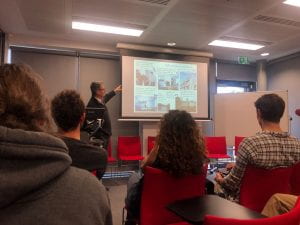 Jon opened by admitting he initially came to Bristol specifically for wildlife filmmaking but got somewhat side-tracked. He followed his Zoology degree with an MSc in Conservation at UCL, encouraging the audience to do something they’re fascinated with. Since then, he has researched baboons in Namibia, fruit bats in the Comoro Islands (whose descendants currently live in Bristol Zoo!) and specialised in beetles at the Natural History Museum. After completing his “interesting stuff”, he began work at a small independent ecological consultancy company which became part of Arcadis, one of the world’s largest environmental consultancies, and remains there 22 years later. Ecological consultants work with developers to make development more sustainable and reduce the impacts on local biodiversity. Jon said it is now a common career and can be tailored to your interests, from practical surveying to office-based work. Now the Head of Ecology at Arcadis and leading a team of 65 ecologists, Jon doesn’t do fieldwork anymore but has fond memories of the late nights, early mornings and long hours made enjoyable by the team he worked with. He joked about how his is a more accessible career than Niall’s or Sophie’s, but nonetheless crucial to the conservation of British biodiversity!
Jon opened by admitting he initially came to Bristol specifically for wildlife filmmaking but got somewhat side-tracked. He followed his Zoology degree with an MSc in Conservation at UCL, encouraging the audience to do something they’re fascinated with. Since then, he has researched baboons in Namibia, fruit bats in the Comoro Islands (whose descendants currently live in Bristol Zoo!) and specialised in beetles at the Natural History Museum. After completing his “interesting stuff”, he began work at a small independent ecological consultancy company which became part of Arcadis, one of the world’s largest environmental consultancies, and remains there 22 years later. Ecological consultants work with developers to make development more sustainable and reduce the impacts on local biodiversity. Jon said it is now a common career and can be tailored to your interests, from practical surveying to office-based work. Now the Head of Ecology at Arcadis and leading a team of 65 ecologists, Jon doesn’t do fieldwork anymore but has fond memories of the late nights, early mornings and long hours made enjoyable by the team he worked with. He joked about how his is a more accessible career than Niall’s or Sophie’s, but nonetheless crucial to the conservation of British biodiversity!
Sam Harris – Host, Growth Mindset Podcast
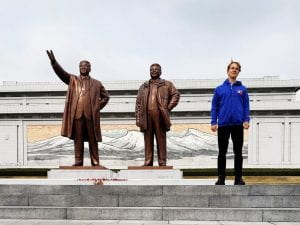 Sam’s life since graduating in 2013 takes an alternative route. During the first year of his degree, he spent his spare time coming up with business ideas, settling on a successful cycle logistics company and jumpstarting an entrepreneurial career. Sam admitted that he hasn’t technically had a ‘real job’ since university but has been volunteering at start-ups and charities to gain valuable experience. He now hosts the ‘Growth Mindset Podcast’ where he interviews and tells the stories of fascinating individuals, teaching him to learn as much as possible rather than following the money. Sam had an interesting take on the use of his degree, comparing evolution, competition, niches and resource exploitation to key business concepts, and explored the similarities between running a business and an experiment. Alongside the podcast, Sam has spent time in North Korea, lived tech-free in a forest in Tasmania, and spent ten days silently meditating in the Himalayas, and reflected on how such experiences have influenced the way he views the world and society today. You can hear more about Sam’s explorations on his podcast at www.growthmindsetpodcast.com!
Sam’s life since graduating in 2013 takes an alternative route. During the first year of his degree, he spent his spare time coming up with business ideas, settling on a successful cycle logistics company and jumpstarting an entrepreneurial career. Sam admitted that he hasn’t technically had a ‘real job’ since university but has been volunteering at start-ups and charities to gain valuable experience. He now hosts the ‘Growth Mindset Podcast’ where he interviews and tells the stories of fascinating individuals, teaching him to learn as much as possible rather than following the money. Sam had an interesting take on the use of his degree, comparing evolution, competition, niches and resource exploitation to key business concepts, and explored the similarities between running a business and an experiment. Alongside the podcast, Sam has spent time in North Korea, lived tech-free in a forest in Tasmania, and spent ten days silently meditating in the Himalayas, and reflected on how such experiences have influenced the way he views the world and society today. You can hear more about Sam’s explorations on his podcast at www.growthmindsetpodcast.com!
Lewis Honey – Delivery Manager, Humanity and Inclusion
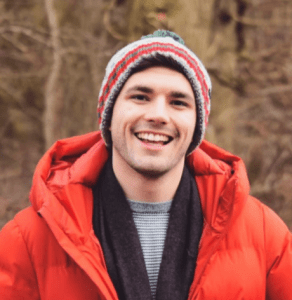 Lewis graduated in 2015 without knowing what he wanted to do. He spent 2 years working for the NHS in Emergency Preparedness and Business Continuity where his curiosity for public service developed, consequently applying to the Civil Service Fast Stream as a way to fulfil this interest. This path immediately provided him with the unique opportunity to spend six months living in a condemned Navy submarine fort in Portsmouth whilst working as a Programme Manager at the Ministry of Defence. His second placement was as Delivery Manager for Humanity and Inclusion, a charity working in situations of exclusion, conflict and disaster to help vulnerable and disabled people meet their basic needs and promote respect for their fundamental rights. Lewis has since moved onto an exciting new posting in the Home Office where he is working on Brexit! Aside from his career, he still wanted to make the most of his science degree and in January 2019 he became a Trustee of ‘Lightyear Foundation’, a Bristol-based charity that breaks down the barriers to disabled children taking part in STEM subjects. His final message was that it’s absolutely fine to not know exactly what you want to do before finishing university; the important thing is to challenge your own preconceived ideas of what is your ‘ideal’ career choice, and then make the most of the opportunities you seek out.
Lewis graduated in 2015 without knowing what he wanted to do. He spent 2 years working for the NHS in Emergency Preparedness and Business Continuity where his curiosity for public service developed, consequently applying to the Civil Service Fast Stream as a way to fulfil this interest. This path immediately provided him with the unique opportunity to spend six months living in a condemned Navy submarine fort in Portsmouth whilst working as a Programme Manager at the Ministry of Defence. His second placement was as Delivery Manager for Humanity and Inclusion, a charity working in situations of exclusion, conflict and disaster to help vulnerable and disabled people meet their basic needs and promote respect for their fundamental rights. Lewis has since moved onto an exciting new posting in the Home Office where he is working on Brexit! Aside from his career, he still wanted to make the most of his science degree and in January 2019 he became a Trustee of ‘Lightyear Foundation’, a Bristol-based charity that breaks down the barriers to disabled children taking part in STEM subjects. His final message was that it’s absolutely fine to not know exactly what you want to do before finishing university; the important thing is to challenge your own preconceived ideas of what is your ‘ideal’ career choice, and then make the most of the opportunities you seek out.
Guy Cowlishaw – Senior Research Fellow, Zoological Society of London
 During the second year of his Zoology degree, Guy was set on a career in research, so began searching for experience for his PhD applications, eventually studying rhesus monkeys at the Caribbean Primate Research Centre. He then studied a PhD with Professor Robin Dunbar in Anthropology at UCL on primates. Whilst initially apprehensive, seeing himself as a zoologist rather than an anthropologist, that exposure to anthropology broadened his horizons and benefitted his subsequent work, particularly that on the bushmeat trade. Guy then spent two years teaching on UCL’s MSc course in Conservation before taking up an ESRC research fellowship back in the UCL Anthropology department. During this fellowship, he applied for a research fellow position at the research branch of the ZSL, the Institute of Zoology. Whilst unsuccessful, his well-received application gained him an alternative position and he now works there as a Senior Research Fellow. Guy’s current research involves long-term study at the Tsaobis Baboon Project, the impacts of the bushmeat trade on wildlife and local communities, and the dynamics of species extinctions. His presentation finished with a reminder to keep an eye on the bigger picture and be prepared to make short-term sacrifices to meet long-term goals.
During the second year of his Zoology degree, Guy was set on a career in research, so began searching for experience for his PhD applications, eventually studying rhesus monkeys at the Caribbean Primate Research Centre. He then studied a PhD with Professor Robin Dunbar in Anthropology at UCL on primates. Whilst initially apprehensive, seeing himself as a zoologist rather than an anthropologist, that exposure to anthropology broadened his horizons and benefitted his subsequent work, particularly that on the bushmeat trade. Guy then spent two years teaching on UCL’s MSc course in Conservation before taking up an ESRC research fellowship back in the UCL Anthropology department. During this fellowship, he applied for a research fellow position at the research branch of the ZSL, the Institute of Zoology. Whilst unsuccessful, his well-received application gained him an alternative position and he now works there as a Senior Research Fellow. Guy’s current research involves long-term study at the Tsaobis Baboon Project, the impacts of the bushmeat trade on wildlife and local communities, and the dynamics of species extinctions. His presentation finished with a reminder to keep an eye on the bigger picture and be prepared to make short-term sacrifices to meet long-term goals.
Simon Carley-Smith – Physiotherapist, NHS
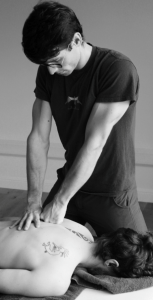 Simon graduated in 2005 not knowing what he wanted to do except stay in science. He also went to Bolivia the year after Niall McCann but discovered he wasn’t ‘cut-out’ for fieldwork and wanted to have more of an impact. He accepted a PhD with Professor Mark Viney at Bristol, studying nematodes in rat faeces, finding that he didn’t enjoy the day-to-day process of research enough to continue in the field. So, following his PhD he focused on his other passion and started a rock-climbing company in Cornwall, highlighting that the analytical aspect of his degree gave him the necessary skill-set to do so. After some time running this business, he decided he no longer wanted to live in Cornwall and trained to be a physiotherapist, ensuring he could still incorporate science into his career. Simon now works with British gymnasts, such as Olympic-potential Amelie Morgan, is a Level 8 Clinician in Hampton House, and runs a rock-climbing physiotherapy business ‘Rise’. His advice was to be passionate about what you want and you will achieve it, emphasising the importance of surrounding yourself with passionate people. If you don’t know what you want, try as many things as you can!
Simon graduated in 2005 not knowing what he wanted to do except stay in science. He also went to Bolivia the year after Niall McCann but discovered he wasn’t ‘cut-out’ for fieldwork and wanted to have more of an impact. He accepted a PhD with Professor Mark Viney at Bristol, studying nematodes in rat faeces, finding that he didn’t enjoy the day-to-day process of research enough to continue in the field. So, following his PhD he focused on his other passion and started a rock-climbing company in Cornwall, highlighting that the analytical aspect of his degree gave him the necessary skill-set to do so. After some time running this business, he decided he no longer wanted to live in Cornwall and trained to be a physiotherapist, ensuring he could still incorporate science into his career. Simon now works with British gymnasts, such as Olympic-potential Amelie Morgan, is a Level 8 Clinician in Hampton House, and runs a rock-climbing physiotherapy business ‘Rise’. His advice was to be passionate about what you want and you will achieve it, emphasising the importance of surrounding yourself with passionate people. If you don’t know what you want, try as many things as you can!
After the presentations, students, staff and alumni met in the Sky Lounge of the Life Sciences Building for food, drinks and networking. The chance to hear from alumni left the audience with a sense of renewed motivation and relief from the pressure of making theoretically ‘life-changing’ career choices so early in life. There is a certain comfort that can be found from hearing happy and successful people who didn’t follow a rigid career path that love where they have ended up today! This really was an invaluable opportunity for undergraduates to become inspired to explore their career options whilst gaining some important advice to help them along the way. The key message to be taken away from the evening was to be passionate about your interests and make the most of every opportunity you can to end up doing something you truly love.
Written by Ellie Jarvis, Zoology (MSci)

